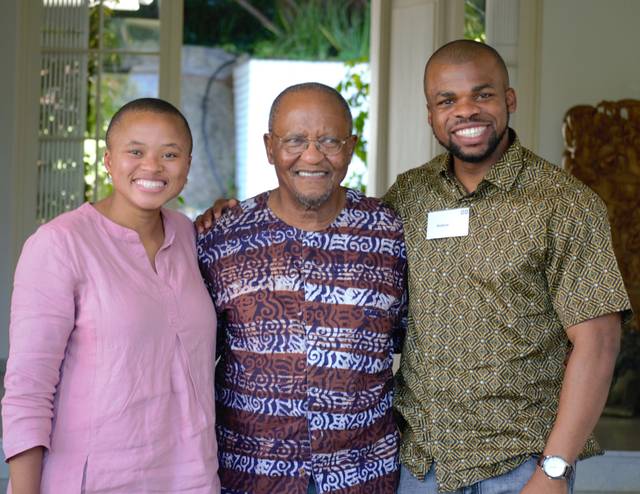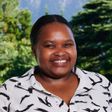
Foundation News
Decolonisation starts at home: An inter-generational dialogue
The Mandela Rhodes Foundation believes that the starting point of leadership is to focus on the self, allowing the inner work to translate into the external changes being sought. ‘Decolonising the Self’ therefore becomes a useful starting point in the project of decolonisation. It is a prompt towards both personal and institutional dismantling and an invitation to challenge invisible colonial symbols in our own lives. At the 2020 Leadership workshop one of the sessions held was an intergenerational dialogue where this idea was probed further. On the panel sat MRF Chairman Professor Njabulo Ndebele, MRF CEO Judy Sikuza and Mandela Rhodes Scholar from the Class of 2018 Andrew Akpan. Through personal storytelling, they were able to give the Class of 2020 a sense of how colonialism has affected and continues to affect how they navigate their lives and how they’ve taken on the challenge of decolonising themselves.
Situating ourselves in history and making sense of the present: Professor Ndebele
Prof, as he is affectionately addressed by MRF staff and Scholars, opened up the floor by recounting how far South Africa had come since apartheid, framing his reflections with gratitude. He noted that decolonisation is both internal and external work and in the case of South Africa, he acknowledged that the project of decolonisation was not without casualties. He therefore thanked the many people who fought for the freedoms we now enjoy and encouraged those who are still here to take responsibility so that the future may flower. He reassured us that although “the past may be resilient in its effects, it cannot be relived.” From this point he was able to start his journey towards decolonising himself.
Prof Ndebele offered an example of the Anglican cathedral where he attends church and how in the last few decades he has seen a massive change in representation within its structures. The Anglican church’s colonial legacy is well documented and Christianity as a whole holds a contentious place within the discourse of decolonisation. “I may dislike some aspects of the structure but I have decided to worship here. You’re a product of the world you’re born into. You try to succeed in that world in a way that makes sense to you," he explained.
Decolonising the self in the context of a wider system: Andrew Akpan
Andrew shared that in his country of birth, Nigeria, what is ‘white’ is seen favourably and as worthy of admiration. Whiteness is aspirational and this is present in the languaging of whiteness and in practices like skin bleaching, hair straightening and in affirmations and names. He brought this into his story in order to frame his upbringing and problematise his own excelling within such a system.
Andrew went on to complicate the idea of decolonising the self by asserting that the world is not designed to allow individuals to challenge the social, political, and economic orders. He said it would be difficult to ever claim to have successfully decolonised the self while existing in a system that is in conflict with that. “Such revolution is not easy as I still have a place in the system. I work within these orders and I’m rewarded with a salary that I live on and offer some to those I love.” He said that even being awarded an opportunity such as the Mandela Rhodes Scholarship is partially a result of how well he has assimilated into colonialism, which is a reality that engenders constant reflection on the complexities inherit in the process of decolonisation
The constant process of conscious liberation: Judy Sikuza
Judy shared some stories and insights from her own life growing up in the Eastern Cape, South Africa. When democracy came in 1994, she attended a former Model C school (formerly reserved for white learners), and this new integration complicated her sense of identity. For Judy, the most fundamental step in decolonising herself is the process of awareness. A true seeing, recognising and unpacking of what colonial mentality actually taught her about herself. She reflected on how colonial mentality ingrained in her the aspiration towards and assimilation into western cultural modes to the neglect and rejection of her own.
Judy’s perspective of decolonising the self prioritises the present. “The aim is not to return to some idealised place of yesteryear. It is a process of being grounded in the now,” she said. In the now she recognises that the work of unlearning false messages is continuous and has to be conscious. Judy has learnt to celebrate her ability to navigate the worlds that she viewed as being in tension with each other, from a place of “conscious liberation”. In addition to this, her approach to the project of self-decolonisation extends to using the power and privilege that she has gained through her education to create more opportunities for others to be their full authentic selves. “Decolonising the self is about rejecting any system or group that seeks to impose its power and dominance over me in a way that makes me feel less than.”
No single narrative of decolonisation
The discussion succeeded in giving three very different perspectives as opposed to giving a sanitised single narrative of the task of decolonising the self. Professor Ndebele reminded us to be grateful for the strides we as humanity have made and how far we have come even though there is still more work ahead. Andrew took a systems view, examining and critiquing the systems he has existed within and how his survival in them may actually serve to strengthen the status quo. Judy gave a more personal take, highlighting that even in a world where who we are may not reflect the hegemonic class, our own individual contributions are still valuable. These multiple perspectives allowed everyone who attended the dialogue to choose how best to approach this journey in their own lives, and to ask themselves some questions they may not have thought of before.
This article was co-written with Lunathi Ngwane.







